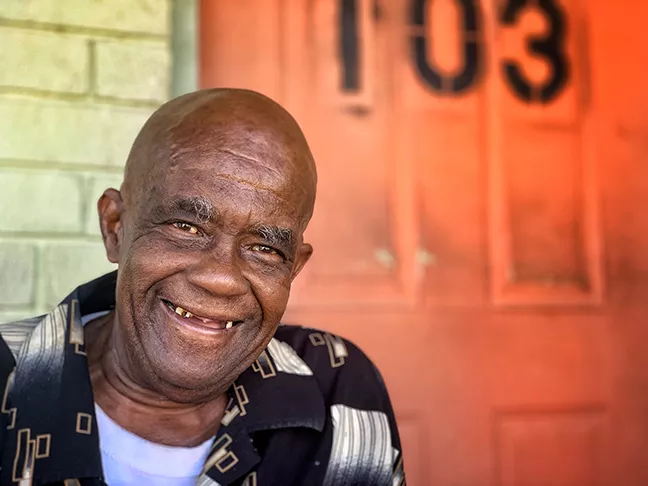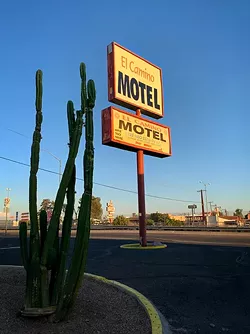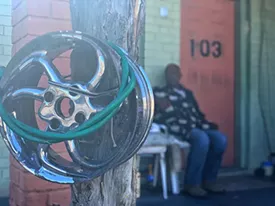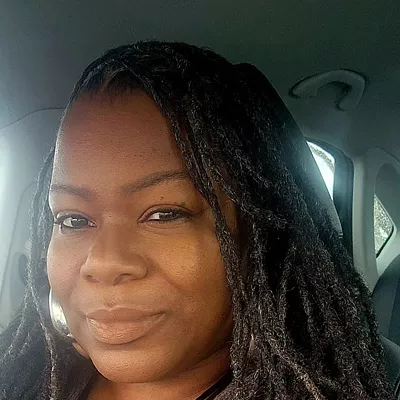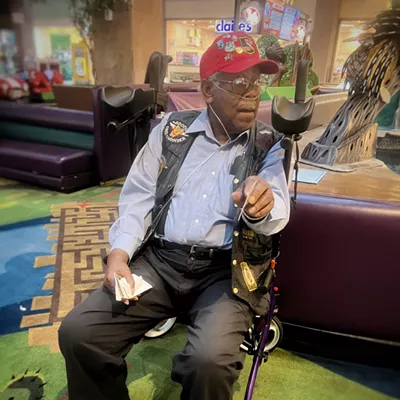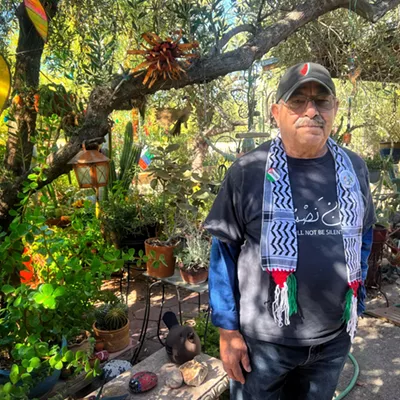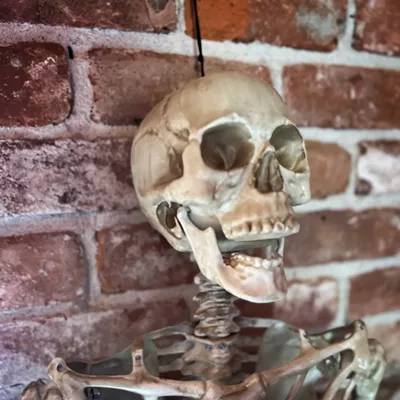Sitting outside Leon Love's room one hot June afternoon, we watch the motel owner evict a trio of squatters. Much screaming and shouting results in a surly procession of filthy backpacks and sad slouches moving toward Benson Highway and Sixth Avenue. Alison, the mangy motel calico, gnaws meat off a bone she dragged from a nearby trash container. The landlord does what he can to keep the pros and dealers at bay.
Love's perched on his plastic chair: He is security here.
I don't bring shit to our conversation. Love brings more, even as chemo sizzles through his system, fogging up his memory. Hints of his lively mind come out and he explains, in soft and calm tones, how his cancer has returned but it isn't going to get him. Sometimes it is easy to see the heavier thoughts riding shotgun behind his dark eyes, hiding truths all of us hide from ourselves, and the world. Leon sees all here at the El Camino Motel, knows all too, but reveals little.
"It used to be really crazy here," he smiles.
And what about this flat, mint-green El Camino Motel? Nothing here feels clean, even Alison is tired, dirty and starving. Its two rows of maybe 20 rooms mix bummer elements of other places, like a neglected park for homeless or a rank bus station waiting room.
It's transient, languid and lonely, and feels like the world is shutting down, or it did shut down and no one told us yet. The poignance hums like the heat.
The El Camino holds nostalgic weight for Tucson old-timers, and represented boomer prosperity and automobile open-roadisms long before grease and dirt circled its doorknobs. One 1940s postcard called the hacienda-style El Camino "The Gateway to East Tucson," when it was freshly constructed with a grand neon sign, sprawling grounds, slide-equipped swimming pool, peppermint-swirl umbrella canopies, and neat, angled green grass. The neighboring and storied Spanish Trail motel was flying high and Interstate 10 hadn't yet strangled off the old Benson Highway.
Now the smell of overcooked carbs and even the ammonia-like odor of bodies digesting themselves waft from open doors. The faded Pepsi vending machine outside hasn't operated in ages, an apt metaphor of economic and spiritual exasperation—even the sugary stuff ain't workin'—time-stamped by president what's-his-name. Such omniscient dread trumps even the simple wear-and-tear of a suffering proletariat. Man, you can learn so much about Tucson, about this country, by hanging at the old gateway to East Tucson. The displacement, the sexism, the racism, the gentrification, the inequality of the old and the young, on the faces of the disregarded and those who never stood a chance.
A TV blares in the next room, a show about serial killers.
Betty Castro lives in that room, rents it for a hefty $700 a month, and it's just one ugly room and an ugly kitchen and an ugly bathroom and the refrigerator sucks and the shower backs up. A Motel 6 is cheaper. But no car and no luck and you take what you can get in the precise moment you can get it. She was homeless three years leading up to the El Camino, and this is a moment. She is three months meth-free but saliva still gathers in the corners of her mouth when she talks. It takes time with that stuff. She has not been at the El Camino long and freelances as a carpet installer with a friend. But her knees are bad, and sometimes she can't work. She'll never prostitute again, no way. The self-hatred was unbearable.
The three of us sit in chairs under the eve, lots of conversation and some cheer, relief masquerading as happiness. Love and Castro have known each other a few weeks, as long as she has been here. Today they learn more of each other.
Castro is scarred in and out, but beauty holds steady. She wears red and blue necklaces of both the Bloods and the Crips—few get in with both gangs—and she's prideful. She's seen unimaginable suffering, human grotesqueness and the highs and lovely things too. She laughs often.
She's a Puebloan Native American (Tigua), lived on a reservation near El Paso. Mom is 100 percent but dad was white, sold guns and drugs for a living, and he died young. He was a full-on KKK racist, she says, though he married "an Indian." She was 8 years old when he molested her. No one believed her then. "My mother," she says, "was the only one who loved him."
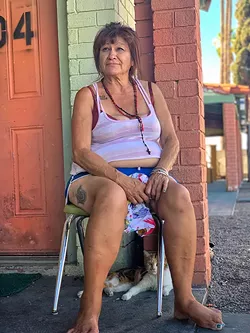
She was huffing spray paint at 12, and boy how the addictions can pile up.
Mom is alive, living in Tucson and would take her in as long as she is off meth. Castro is 48, and not so keen on living with mom.
Her right leg shows a tattoo inscribed with the names of her two daughters, Selena and Bethany, both of whom are adults, she says, and happy living in Sierra Vista. The name "Protillo" is tattooed on her right shoulder—she explains it is her current boyfriend, she laughs how she misspelled his name on her skin. He's an undocumented Mexican from Sinaloa, recently arrested. Left her in a lurch and she waits for him. Both of her ex-husbands beat her up and she figures her daughters suffer PTSD from it.
When Love smiles there are teeth on sides but not in the front. Like a vampire at odds with a calm temperament. Tucson born, one of six, Love moved to Bisbee young when dad found work in the Phelps Dodge pit. Blew out both knees playing defensive end for Bisbee High back in the late '60s. Instead of a doctor he found himself sticky in Vietnam jungles fighting other teen boys, bad knees and all.
"I was never a complainer," Love says of Nam, lighting a smoke. "I would just go out and do it. I learned a lot."
Post-Nam Arizona wasn't easy, not for a vet, especially not a black one. "My dad," he says, "would tell me 'People can talk, it's just words, but they can't put their hands on you.'"
Love worked the mines like his old man, underground, breathing the worst air you can imagine. Married, had kids, got cancer, lost work. Found himself doing nearly three years for selling crack in Tucson. Like Castro, his self-respect runs deeper than surface: "It ain't anything to be proud of. That happened and now I am here."
His knees are balloons inside jeans, bone-grinders to walk on, but he makes it okay to nearby Food City or Circle K. He is grateful, to be sure, for the local veteran's hospital and rides to chemotherapy.
Castro too is tough, with barrio feminismo, bi-lingual, fast frank speech, intelligent. When her eyes soften it feels like a reward, like she is giving something to you. Several front teeth were busted out ("the butt of a gun"). She was once kidnapped, tied up, beaten. A nearly inscrutable yarn involving someone she knew, and she dropped the charges.
She picks her battles. She did do short hard time for dealing meth, and paid a hefty fine.
Elizabeth (she asks I not use her last name) strolls up, joins the conversation. An ill-nourished pigeon near our feet sticks its head inside the end of a water hose in hopes of finding moisture.
She is pin-eyed and her elbow pits show gnarly scars, yet she is too traditionally pretty to be a woman living alone at the El Camino, it goes hard against type. She dominates word flow. She has children somewhere else and comes from Indianapolis. She doesn't want to live here, but she is stuck here and it is obvious she knows the South Tucson streets. Tells me she was CIA and at 38 years old is the youngest retired woman from said agency and now she wants to become a runway model, and in that moment I don't want her to be batshit crazy. She wants to tell me all about her world, and will I come back, maybe in a week or two, and come to her room to listen? Betty and Leon look to each other. Elizabeth moves off and vanishes around a corner, tall and thin, a junkyard swan.
(I see Elizabeth again a few days later in a skin-tight green jumpsuit Betty gave her and she seems even thinner now if that is possible and asks for $5 dollars to eat on and I give her $10 and who knows where that will go, but I hope she'll feel a tiny bit better. Betty tells me both she and Elizabeth get help from COPE community services.)
El Camino owner Jeegarkuma Amin steps into our shade, reluctant to talk, but does, some. There are a few vacant rooms here and Amin can rattle off the dozen or so names of all occupants in the others. He can do that for all his motels.
From India, Amin looks late 40s, is educated, well-dressed, drives a Camry hybrid, been all over the world, Australia, Europe etc. He talks down to women, that burden of Asian-Indian women and their men, and his humor is foul: "Maybe we could put a hole in the wall so Love can fuck you through it." He says that to Castro, laughing. Everyone laughs, including the married Hispanic couple who do cleanup here. They have to laugh because he is the owner and the boss. To them he is wealth and therefore power. Castro seems grateful he rented to her. Why wouldn't she be?
"I finally got this place," Castro says to me, "and I never want to be homeless again."
Amin points to the room of the earlier eviction: "The easy road is 'Hey, can I suck your dick?' He calls it "pussy and cocaine," where a homeless prostitute holes up in a room for free and fucks for drugs.
He doesn't tolerate this, he says, and he can't keep watch all day. He won't throw anybody out of El Camino unless he has proof they are selling ass or dope.
He talks business and knows South Tucson as well as any local judge or city scholar, and has become skilled at conversing certain class hustles in at least two languages, his English ain't bad; he's been here since the late 1990s.
"You think because there's a place roasting coffee beans now South Tucson is getting better? Change is when you see a glass high-rise. If every city department does their job properly the city will shine. It's simple. We have to achieve positivity."
Everyone here nods.
His reasoning: If 300 homeless people gather, 50 will be unredeemable human roaches.
The human roaches, he calls them, the prostitutes and the homeless and the addicted who squat and sell fucks and junk. He has his hypotheses on life, how he unknots and defines it, and it is unwavering, and he seems blind to certain elements of humanity, the details in the pathologies of loneliness and addiction and deep depressions. Also, he owns some of the seamiest motels in Tucson (besides this one, there are two on Sixth Avenue, the Star and the Arizona) that often contain silent horrors where light hardly shines, where stories are rarely told, unless it involves cops, kidnapping or meth psychosis or worse, but yet he has convinced himself of a sense of life that only flickers on the exteriors of people, the scars they wear on their bodies. He distills things that way.
"The girls?" he says, talking about a female prostitute tossed from here, "they are not bad people. They don't want men to fuck them. But they have no choice. We need to stop the heroin. Rebab all the kids and moms."
Amin has figured a way to survive in a business few could operate. Running these motels cannot be easy. And he isn't in the business of handouts.
He turns around and begins to climb into his car. Castro tells him she is worried she will be late on rent. He tells her and all of us that God has been good to him with money, so she can be late. But not too late or she'll be gone. He motors off.
Half-hour later a young Hispanic woman strolls by in white hot pants and black fishnets, picking her teeth with a toothpick, heading out to Sixth Ave. I could be "a reporter," as someone had already described me to her, and she shouldn't talk to me. Her man stays back in his room. Castro says, "If you have $20 go knock and see what you can buy from him."
We are haunted by who we once were and who we might've become, pushed to self-sabotage for any glimpse of glory, or relief. Maybe a glimpse of what it could feel like to be OK, to be, maybe, ourselves, above a bankrupting world.
Several days later at the El Camino, the heat of summer has grown more unbearable and dirt air blows in from nearby empty lots and Interstate 10. Love's clothes are clean, they are always clean, and he pulls his earbuds out to talk. We joke how black folk age with much more grace than white folk, and how maybe that has everything to do with soul, and his vampire grin shows age and a wisdom inside of it, the miles through uncharted worlds I will never know or even begin to understand.
Love is pleasant despite shit-luck suckerpunches, which don't include his three grown children and his siblings, to whom he speaks with regularity and who have helped him through the years. He tells of a nephew who swung by the day before and how he was so moved his face was all tears.
He has been an El Camino resident for at least 10 years, a lot of that time, I figure, perched on the pillowed plastic chair outside the door, smoking Eagle 20s. Today he continues his security detail, an eye for owner Amin. Just a gentle black man in his 70s shaded by eves of a classic Tucson motel long ago gone to seed, and it is so easy to see. ■
Brian Smith's collection of essays and stories, Tucson Salvage: Tales and Recollections of La Frontera, based on this column, is available now on Eyewear Press UK. Buy the collection in Tucson at Antigone Books, 411 N. Fourth Ave.

